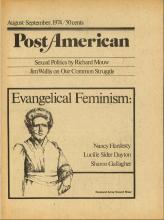I want to share some very personal feelings. I became part of the women’s movement because I am concerned about how difficult it is for women to get credit, about the widening pay gap between the sexes, about the dashed hopes of women who sought professional careers, and about the small number of visible women in our political, economic, and religious life. But the one thing I did not understand was the concern about language -- words such as “chairman,” “God the father,” “mankind.” Why all the fuss? It was just picky when there were bigger, more pressing issues at hand. I’m sure many of you feel that way as you hear speakers struggle awkwardly to demasculinize their language.
Today, I’m in a different place. Let me share my journey with you. Tucked away in an issue of Redbook magazine, I found a short story of a 3 1/2-year-old girl who was watching “Sesame Street.” Instructions for some activity were being given by the instructor to the children, and masculine pronouns were used: “First he does this; then he does that.” The little girl turned off the television set in tears because she was not included and she wanted to participate. I was struck by how easily we adults intellectualize the generic nature of masculine words, but not that little girl--she was experiencing being un-included, a non-person.
Read the Full Article
To continue reading this article — and get full access to all our magazine content — subscribe now for as little as $4.95. Your subscription helps sustain our nonprofit journalism and allows us to pay authors for their terrific work! Thank you for your support.
Already a subscriber?
Login
